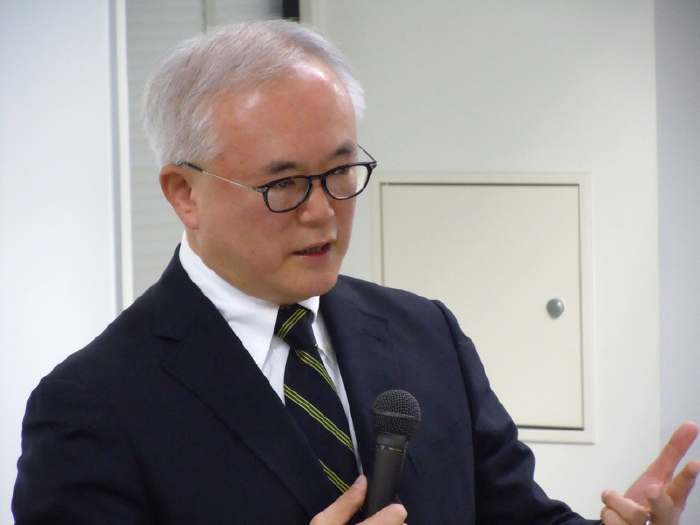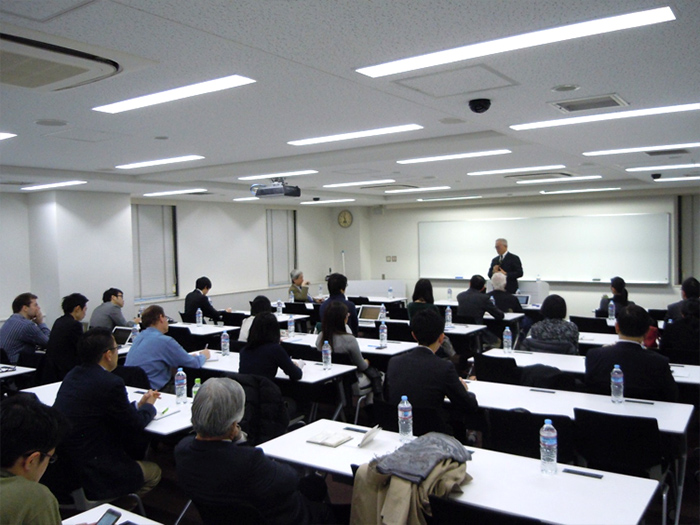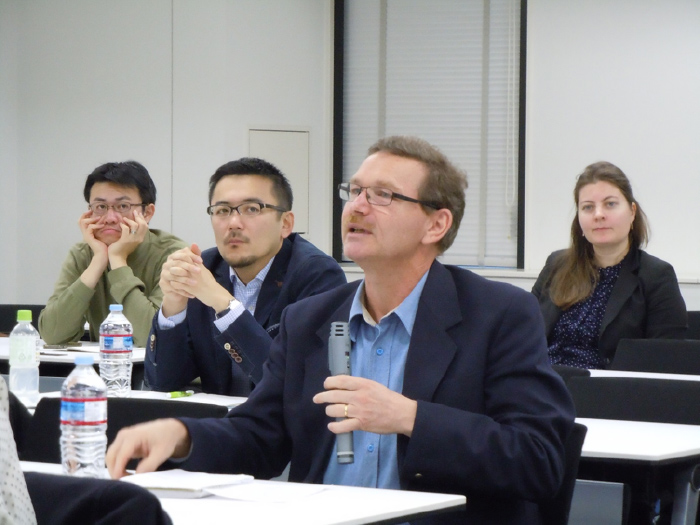SSU Forum with Professor Tomohiko Taniguchi
| Date: | Tuesday, November 18, 2014, 10:30-12:00 |
|---|---|
| Venue: | Kojima Conference Room, 2nd floor, Kojima Hall |
| Subject: | Japan's “Lippmann gap“ and PM Abe's Diplomacy |
| Lecture: | Professor Tomohiko Taniguchi(Special Advisor to the Cabinet of Prime Minister Shinzo Abe/Professor, Keio University Graduate School of SDM) |
| Language: | English |
| Hosted by: | Security Studies Unit, Policy Alternatives Research Institute, the University of Tokyo |
The Security Studies Unit of the PARI was delighted and honoured to host Tomohiko Taniguchi, Professor at Keio University Graduate School of System Design and Management, and Special Advisor to the Cabinet of Prime Minister Shinzo Abe. Professor Taniguchi delivered a talk on Japan's “Lippmann gap“ and PM Abe's Diplomacy, which illustrated the most important aspects of Japan’s foreign policy trajectory under the current administration.
SSU Director Professor Kiichi Fujiwara introduced Professor Taniguchi as a leading expert in Japanese foreign policy, currently working as an advisor to PM Shinzo Abe’s cabinet, and certainly a key person behind the recent successes of the present government.

Professor Taniguchi thanked Professor Fujiwara for the introduction, and immediately provided an overlook of the speech he intended to deliver, which focused on providing a “report card” of Abe administration’s diplomatic efforts, and a brief final comment on the domestic political situation, considering the upcoming snap elections.
With regard to the general conceptual framework of Japan’s foreign policy, Professor Taniguchi stressed the importance of Japan’s geographic position, which constrains the number of available options. Japan is an island nation finding itself at the end of a long sea lane stretching from the Persian Gulf eastwards to the Malacca Straits and then northwards to the East China Sea and the Sea of Japan. Japan is a sea-faring nation and trade-oriented economy, having therefore common interests with other sea-faring, trade-oriented nations, particularly democratic states. If those elements are considered, the number of available foreign policy directions becomes somehow fairly narrow. He consequently argued that Japan will continue to stay in the current alliance system for as far as it is possible to predict. The geographic location of Japan also means that one of its vital objectives in foreign policy is to maintain a good balance with the continental powers of Asia, primarily China. Again, the very geographic reality of Japan makes the relation with China a crucial element of Japan’s national security interests.

Against this background, Professor Taniguchi argued that there cannot really be a “personalised” foreign policy bearing the name of specific individuals, Japan’s foreign policy being instead so heavily influenced by the above-mentioned, pre-set conditions. Indeed, many of the initiatives taken by PM Abe can be seen as the continuation of those conducted by previous administrations, particularly Yoshihiko Noda’s government (2011-2012) and his diplomatic activities in Southeast Asia. PM Abe has however taken such foreign policy to a higher level, by visiting 50 foreign countries in the 23 months since the beginning of the current term in office. Tokyo’s victory in the bid to host the 2020 Olympic Games is a remarkable achievement, which was made possible also because of his restless diplomatic effort. Even more important has been the continuation of a policy of close cooperation with India and Australia, which, Taniguchi argued, have an important strategic value to Japan with a view to ensuring the security of the seas and of the East Asian region as a whole. This extends also to Japan’s newly energised relations with many countries in Southeast Asia, which saw important diplomatic missions carried out by PM Abe, himself warmly welcomed in all ten ASEAN members’ capitals.
Professor Taniguchi compared PM Abe’s diplomatic activities to those of Japan’s Prime Minister Nobosuke Kishi (1957-1958), who travelled to numerous countries in order to break Japan’s relative diplomatic isolation in the post-WWII period. PM Abe has been performing a similar role, Professor Taniguchi argued, thus reducing Japan’s “Lippmann gap”, i.e. the gap between a country’s foreign policy potential and its actual level of engagement in international politics, by making Japan more visible on the world’s stage, and by establishing solid, friendly, and constructive relations with numerous nations.
Finally, commenting on the upcoming announcement of snap elections, Professor Taniguchi has argued that this move is to be seen as a reflection of PM Abe’s attitude not to delay however inevitable difficulties which may lie ahead, but to confront them sooner rather than later.

-
Special Advisor to the Cabinet of Prime Minister Shinzo Abe/
Professor, Keio University Graduate School of SDM
